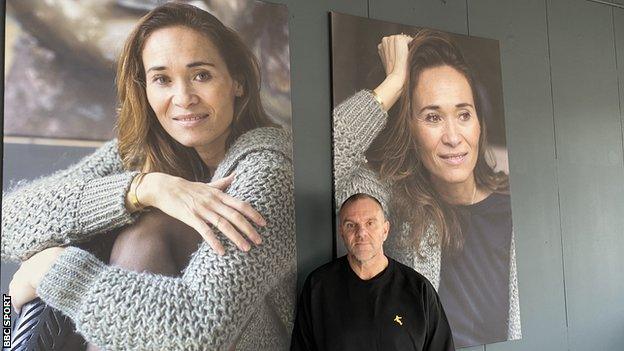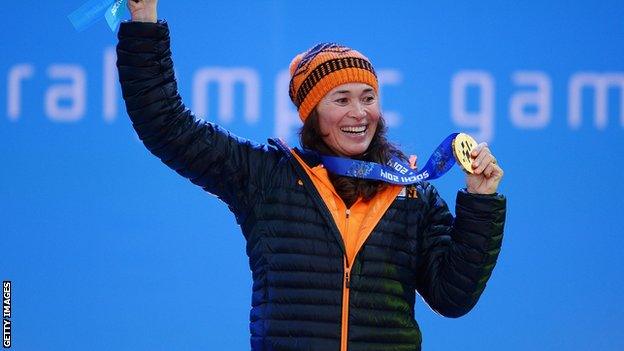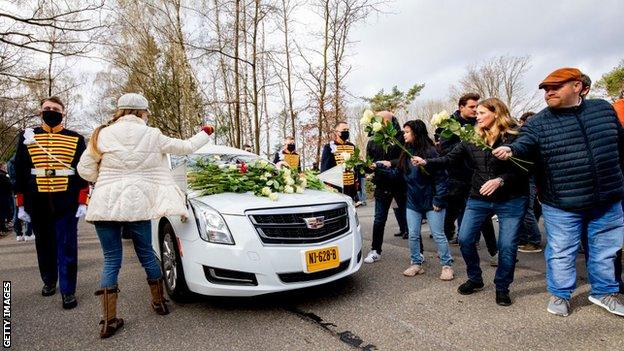Bibian Mentel-Spee: The life and legacy of a Paralympic legend
- Published


Bibian Mentel-Spee died in March 2021 at the age of 48
Bibian Mentel-Spee was a snowboarder. She loved the feeling of being in the mountains, the camaraderie of the riders, the thrill of competing.
She was also a pioneer, one of the driving forces behind the inclusion of her sport in the Winter Paralympics. And she was an inspiration to millions, as she earned sporting success in the face of enormous health challenges. The Games of Beijing 2022 will finish just before the first anniversary of her death at the age of 48.
"She wasn't afraid to die," says her husband Edwin Spee.
"She was afraid to leave behind her loved ones, especially her son. But she wasn't afraid of dying - not in the last five weeks, not in the last hour."
We're talking in Bilthoven in the Netherlands, in the offices of the charity that Mentel-Spee founded and Edwin runs today.
On the wall behind is a huge portrait. As he talks, Edwin's gaze flickers up to the image of his late wife and he pauses frequently, his eyes still on her.
"Bibian was always giving love, and by that she got a lot of love back from the world," he says.
"She chose to live. She chose to become the best version of herself. She was just a master at living life to the max."
Mentel-Spee died on 29 March 2021. Her achievements, within winter sports and beyond, mean she will be remembered for many years to come.

Mentel-Spee's journey to becoming a Paralympic legend began during her campaign to qualify for the Winter Olympics of 2002 in Salt Lake City.
She was a young, successful snowboarder - six times the Dutch national champion - and on course for the Games when she was diagnosed with bone cancer in her lower right leg at the age of 29.
Despite treatment, it became clear that radical action was needed.
"She had to choose for her life, by amputating her lower leg," says Edwin.
It would be the start of almost two decades of illness and medical interventions, treatments and operations. But it was also the start of a sporting life that would inspire millions.
Even before the operation, Mentel-Spee had been plotting a return to the slopes and, despite the doubts of her doctors, she was back to her best just months after the operation, winning a seventh national title.
Edwin says that success, as a newly disabled athlete beating her able-bodied competitors, became the spur for Mentel-Spee to push the boundaries of her sport.
"She got that feeling: well, I had cancer, I lost my leg and now I'm back on my snowboard," he says.
"She knew she had to do something with it, and to show the world that this is still possible. And that's when she decided to start a campaign."
The campaign was to get snowboarding into the Paralympic Games. It took nearly a decade to achieve it.
The sport was then in its infancy - there were other riders in similar situations to Mentel-Spee, but there was little infrastructure, no common rules, no global competition.
So with a group of other Para-snowboarders from around the world, including US athlete Amy Purdy, she set to work.
Together they organised a World Cup circuit, arranged sponsorship, lobbied officials and tried to keep the sport in the public eye. She was determined to prove that her sport belonged at the top table.
That desire to grow the sport meant there came a point where she had to make a choice, says Edwin.
Alongside the campaign for Para-Snowboarding, Mentel-Spee had continued to compete in overall competition, against able-bodied rivals. But now she needed to commit.
Edwin recalls: "She said, if I want the Paralympics, I need to make a decision. Do I keep on racing with the able bodied or do I from now on only race with the physical disabilities?
"And that's the moment she decided to quit able-bodied racing and move over to racing with disabled snowboarders."
It was a long road for Mentel-Spee and her colleagues, but the result was worth it.
After more than eight years of campaigning, she got a phone call to say that snowboarding would be on the schedule at the 2014 Paralympic Games in Sochi.

Mentel-Spee wins the Paralympics' first ever snowboarding gold, at Sochi 2014
Mentel-Spee's cancer returned a number of times in those years, and even as she continued her competitive career and worked on her campaign, she faced several more operations, mainly on her lungs.
"Every time she had to undergo surgery she knew, it's a bad three months, but maybe it will be gone for a year [or] two years. One time, it was gone for almost five years," Edwin says.
All the while, she kept on competing and winning and, by the time Sochi came around, she was the overwhelming favourite to take the inaugural gold in Paralympic snowboarding.
But the burden of expectation, and the energy and effort she had put into the campaign to get to the Games, left their mark.
"I'd never, ever seen her that nervous," Edwin says. "That's what Olympic and Paralympic Games do with an athlete. It's different, it's this magic around these races."
Despite those nerves, Mentel-Spee went on to win gold, ahead of France's Cecile Hernandez-Cervellon and the USA's Purdy.
Edwin says the medal was not just a mark of sporting success.
He says: "Such a big achievement as the first Paralympic snowboard gold medal was also a little bit like a feeling of being invincible, that you can win everything, even the fight against cancer. At the time, we still believed she could grow old."
Mentel-Spee was given a special award at the Sochi closing ceremony to mark her achievement in getting snowboarding into the Games.
She was if anything, Edwin says, more proud of that than her gold medal. And it is clear that her work with her charity, the Mentelity Foundation,, external was at least as important to her as sporting success.
She set it up in 2012, in the midst of her own competitive career and continued struggles with illness, to help share the joy and freedom of boarding and snow sports with young disabled people in her native Netherlands.
It was work that she continued to do until just days before her death. Edwin talks of packed evenings full of Zoom calls, even in the last weeks, when she could barely use her wheelchair to get around.
It is work that Edwin and the Foundation continue today: helping introduce young people to board and snow sports, organising special coaching clinics, funding and providing prosthetic limbs, putting on events and competitions.
"We promised Bibian to continue her legacy, her work for the Foundation, and that is to make life for children with a disability as good as for their able-bodied friends, to give them the same opportunities," he says.
"In the spirit of Bibian this is always something to do with a board - so we have wake boarding, snowboarding, surfing, skateboarding, stand-up paddle boarding."
There are lessons, trips to the mountains, coaching, support and simply fun.
The central idea is that disabled young people can play and compete on equal terms with their able-bodied counterparts, just as Mentel-Spee had done all those years before.
"She helped a lot of people with the Foundation, but she gained a lot from it too," Edwin says. "People don't realise how much energy you get from giving.
"It's because she gave so much that she got so much love back. What drove her through life was helping other people.
"That's why, when she died, there were thousands of people next to the road."

Mourners line the streets and offer flowers during Mentel-Spee's funeral ceremony in Laren, in the Netherlands
If you want to get an idea of what Bibian Mentel-Spee was like, then head to YouTube. There's lots of material available. She was a regular interviewee and public speaker.
She was candid about her health problems and clear-eyed about both her difficulties and successes.
There's a TEDx talk she gave in 2018, external in Amsterdam, six months or so after winning double gold at the Pyeongchang Paralympic Games.
At one point, she shows an X-ray of her neck, and of the metal construction which has replaced a significant part of her vertebrae.
It is, she says, titanium - her "permanent jewellery" - and it was a result of yet another recurrence of cancer.
Removing the tumour in her neck and fitting the metal needed 16 hours of surgery, which was completed just weeks before she went to South Korea for her second Winter Paralympics.
More than two years earlier, doctors had said she likely only had a few more months to live. And yet, once more, she was preparing to go.
Given her health difficulties, there were questions from some about whether it was the right thing for her to be in Pyeongchang.
Mentel-Spee's answer to that was clear, according to her husband.
"She said: 'This is not only the thing I like to do the most, it is also the thing that keeps me alive, because I am in better health than if I am just at home and waiting for my life to end,'" Edwin says.
"[She went] in the spirit of the Games, that participating is more important than winning. This really was her state of mind."
As well as her own health issues, the standards in her sport had developed significantly since Sochi 2014. But when it came to the competition, it was clear she was still a contender, even at the age of 45.
Her neck surgery meant she had had to adjust her stance on her board and work even harder on the technical aspect of racing.
But she could still be a winner and once more she eclipsed her rivals to claim victory in both the snowboard cross and the banked slalom.
That meant two more Paralympic gold medals to add to a collection that, in the end, amounted to 128 victories over her racing career.

After Pyeongchang, Mentel-Spee stopped competing and concentrated her efforts on the Mentelity Foundation and other charitable work.
She needed yet more operations and treatments, and eventually had to use a wheelchair. But her work continued even as her health deteriorated in her final months.
Her last public engagement was a few days before she died - at the opening of a sports facility paid for by the Johan Cruyff Foundation and named after her. Even then, says Edwin, she was thrilled to be there.
She told him: "I get a lot of positive energy from this."
Edwin isn't sure how he'll feel when he sits down to watch the snowboarding events in Beijing.
But he will be watching as Dutch snowboarders such as Lisa Bunschoten and Chris Vos, both mentored by Mentel-Spee in their younger days and Paralympic medallists from Pyeongchang, go for gold.
"Maybe I will be laughing and having good memories," he says. "Maybe I will be missing her so much more than on a normal day and crying my eyes out. I don't know."
He does know how she would react though.
"The funny thing is that Bibian was never crying, except with sports. If somebody had a great achievement, like winning a gold medal, then she would cry.
"But other stuff, she wasn't crying."